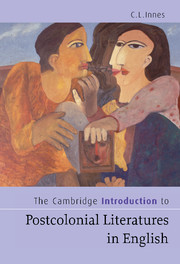Book contents
- Frontmatter
- Contents
- Preface
- Chapter 1 Introduction: situating the postcolonial
- Chapter 2 Postcolonial issues in performance
- Chapter 3 Alternative histories and writing back
- Chapter 4 Authorizing the self: postcolonial autobiographical writing
- Chapter 5 Situating the self: landscape and place
- Chapter 6 Appropriating the word: language and voice
- Chapter 7 Narrating the nation: form and genre
- Chapter 8 Rewriting her story: nation and gender
- Chapter 9 Rewriting the nation: acknowledging economic and cultural diversity
- Chapter 10 Transnational and black British writing: colonizing in reverse
- Chapter 11 Citizens of the world: reading postcolonial literature
- Notes
- Glossary of terms used (compiled by Kaori Nagai)
- Biographies of selected postcolonial writers (compiled by Kaori Nagai)
- Brief colonial histories: Australia, the Caribbean, East Africa, India and Pakistan, Ireland, West Africa (compiled by Kaori Nagai)
- Select bibliography
- Index
Preface
Published online by Cambridge University Press: 05 June 2012
- Frontmatter
- Contents
- Preface
- Chapter 1 Introduction: situating the postcolonial
- Chapter 2 Postcolonial issues in performance
- Chapter 3 Alternative histories and writing back
- Chapter 4 Authorizing the self: postcolonial autobiographical writing
- Chapter 5 Situating the self: landscape and place
- Chapter 6 Appropriating the word: language and voice
- Chapter 7 Narrating the nation: form and genre
- Chapter 8 Rewriting her story: nation and gender
- Chapter 9 Rewriting the nation: acknowledging economic and cultural diversity
- Chapter 10 Transnational and black British writing: colonizing in reverse
- Chapter 11 Citizens of the world: reading postcolonial literature
- Notes
- Glossary of terms used (compiled by Kaori Nagai)
- Biographies of selected postcolonial writers (compiled by Kaori Nagai)
- Brief colonial histories: Australia, the Caribbean, East Africa, India and Pakistan, Ireland, West Africa (compiled by Kaori Nagai)
- Select bibliography
- Index
Summary
This book sets out to consider some of the writing that has emerged during the past century from the numerous and complex range of postcolonial societies which were formerly part of the British Empire. It seeks not only to discuss the authors and texts, but also to raise questions about the ways in which they have been thought about under the aegis of postcolonial studies, and to ask what varying meanings postcolonial literature may have in different contexts.
In the first decades of the twentieth century, European states governed more than 80 per cent of the world's territories and people. Of these the British Empire was the most extensive and powerful, claiming as British subjects a population of between 470 and 570 million people, approximately 25 per cent of the world's population, and laying claim to more than ninety territories in Africa, Asia, Europe, North America, the Caribbean, Australasia and the Pacific. Almost all those territories have now evolved and/or combined into independent states, fifty-three of which constitute the ‘British’ Commonwealth, a voluntary organization which several former colonies such as Burma, Egypt, Ireland, and Iraq declined to join when they gained independence. To a greater or lesser degree, all these territories shared a history of cultural colonialism, including the imposition of the English language, and British educational, political and religious institutions, as well as economic relationships and systems.
- Type
- Chapter
- Information
- Publisher: Cambridge University PressPrint publication year: 2007

